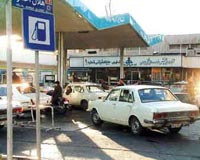 |
New Orleans, Louisiana (AFP) Aug 12, 2010 BP relaunched Thursday operations to finish a relief well and permanently seal its catastrophic Macondo well after a brief suspension due to a storm in the Gulf of Mexico. The remnants of a weakened tropical system halted work on the busted well on Wednesday and overnight Thursday, and thousands of workers had to be pulled off clean-up efforts along the battered Gulf coast. It was first feared that strong winds and high seas could delay operations for up to four days, but the storm passed quicker than forecast and BP said the waters were already calm enough to resume operations. "We're getting things back in place. We're getting back into the relief well that is being drilled and operations are getting back under way," BP spokesman Robert Wine told AFP. The Development Driller III, the vast rig drilling the relief well, was not disconnected, but several miles of drill string was lifted and a sub-sea containment device was inserted to protect the relief well from the storm. After drilling 17,909 feet (5,426 meters) below sea level, the relief well is about 30 feet from intercepting the stricken Macondo well, although the last bit is by far the trickiest and most time-consuming part. Once the interception occurs, engineers will pump heavy drilling fluid, known as "mud," and then cement into the well shaft to provide a permanent seal over the oil reservoir miles beneath the sea floor. BP performed a static kill operation last week that suppressed the gushing oil with mud and cemented in the main drill pipe. After the storm, clean-up operations were also set to restart on land, where oil has washed up on the shores of all five Gulf states. It was not immediately known if the rough weather had pulled up any significant amounts of subsurface oil onto beaches and marshes. Some 4.1 million barrels of oil spewed into the Gulf before BP could fully cap the ruptured well 5,000 feet (1,500 meters) below the surface, in the wake of the massive April explosion on the BP-leased Deepwater Horizon that killed 11 workers. Hundreds of miles of fragile coastal wetlands and once-pristine beaches stretching from Texas to Florida were sullied and the region's vital fishing and tourism industries could be reeling for years to come. BP is setting up a 20-billion-dollar fund to compensate those hurt by the disaster, and earlier this week announced it had made an initial three-billion-dollar deposit into the account.
earlier related report The Financial Times/Harris Poll covering Britain, France, Germany, Italy, Spain and the United States found worries about oil dependency and water pollution since the spill that dumped 4.1 million barrels into the Gulf of Mexico. Large majorities agreed in general terms that oil companies should be more regulated. Sentiment was strongest in France, where 91 percent favored more regulation. Seventy-seven percent of Americans and 73 percent of Britons agreed. The poll, however, found that concerns stemming from the oil spill were less pronounced in Britain, which it attributed to a feeling of patriotism in support of British-based BP Plc. The survey, which covered 6,180 adults in the six nations, found that 48 percent of Britons were more concerned about the issue of water pollution after the spill, well down from figures in the other five countries. Only two percent of Britons and three percent of Americans said they were less concerned about water pollution after the world's largest-ever maritime oil spill. President Barack Obama's administration has insisted that BP pay and secured promises from the company to set up a 20 billion-dollar fund to compensate victims of the disaster. British Prime Minister David Cameron has agreed that BP is responsible for the clean-up and recovery but also defended the oil giant as important for economies on both sides of the Atlantic.
Share This Article With Planet Earth
Related Links Powering The World in the 21st Century at Energy-Daily.com
 Turkey supplies gasoline to Iran
Turkey supplies gasoline to IranAnkara, Turkey (UPI) Aug 12, 2010 As Turkey imports nearly 90 percent of its energy requirements, it has sought reliable contracts with its neighbors to cover its needs. Turkey's agreements with its eastern neighbor Iran have increasingly unsettled those powers that seek sanctions on Tehran because of what many believe is a covert nuclear weapons program. Despite a recent round of U.S.-sponsored sanctions approve ... read more |
|
| The content herein, unless otherwise known to be public domain, are Copyright 1995-2010 - SpaceDaily. AFP and UPI Wire Stories are copyright Agence France-Presse and United Press International. ESA Portal Reports are copyright European Space Agency. All NASA sourced material is public domain. Additional copyrights may apply in whole or part to other bona fide parties. Advertising does not imply endorsement,agreement or approval of any opinions, statements or information provided by SpaceDaily on any Web page published or hosted by SpaceDaily. Privacy Statement |